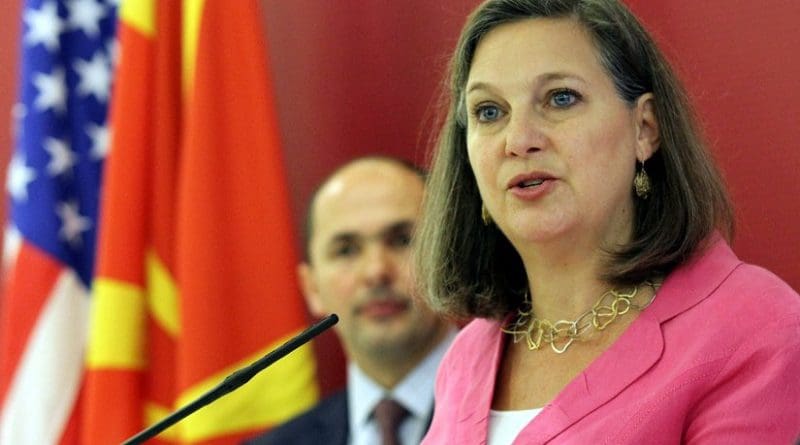US, EU Envoys Expected To Revive Macedonia Talks
By Sinisa Jakov Marusic
Victoria Nuland, the US Assistant Secretary of State for European and Eurasian Affairs, is due in Macedonia on July 11, political sources involved in Macedonia’s crisis talks told BIRN.
Although Nuland’s arrival has not been officially confirmed, sources from the main ruling VMRO DPMNE party and from the opposition Social Democrats, SDSM, briefed that they have been informed of her forthcoming visit.
Nuland’s task would be to boost stalled talks between the four main parties that are now being kept alive by the mediation of the EU and US ambassadors to Macedonia, Aivo Orav and Jess Baily.
“I hope her visit will result in a deal or at least in significant progress on implementing reform priorities before the country can set a fresh date for early elections,” a source close to the talks told BIRN under condition of anonymity.
Reform priorities focus on ensuring balanced media reporting, cleaning up the electoral roll and preventing political influence on voters.
In parallel with Nuland’s visit, or soon after, Macedonia’s political parties also expect the arrival of the special German envoy for Macedonia, Johannes Haindl, who is also expected to help boost talks between the four main parties.
On his last visit to Macedonia, in June, after Macedonia postponed June 5 early elections due to unfulfilled reforms, Haindl said there was a way out of the crisis if the guidelines from last year’s EU-brokered agreement were followed, but warned that time was running out.
Mitko Gadzovski, Political Science Professor at Skopje’s FON University, said he hoped the forthcoming visits will also help strengthen the position of the Special Prosecution, SJO, which was formed last autumn as part of the EU-brokered crisis agreement and tasked with investigating high-level crime.
“One of Nuland’s goals will be to strengthen the SJO through mechanisms agreed between the political parties. One of these mechanisms is the formation of a Special Court Department that would handle the SJO cases,” Gadzovski said.
Since its formation, the SJO has complained of serious obstacles from other institutions, including from the Skopje Criminal Court, which has rejected many of its demands to put suspects under house arrest and has questioned the SJO’s authority to handle cases.
After the SJO started opening cases that mainly concerned alleged criminal activities on the part of current and former state officials from the ruling VMRO DPMNE party, the SJO was accused in the media of working under opposition instructions.
The crisis in Macedonia escalated in February 2015, when the opposition started releasing batches of covertly recorded tapes, which it said showed that the VMRO DPMNE-led government was behind the illegal surveillance of some 20,000 people, including ministers. They said the tapes proved many criminal allegations against government members.
VMRO DPMNE leader Nikola Gruevski, who was Prime Minister from 2006 until he resigned earlier this year under the EU-brokered crisis deal, has said the tapes were “fabricated” by unnamed foreign intelligence services and given to the opposition in order to destabilise the country.

